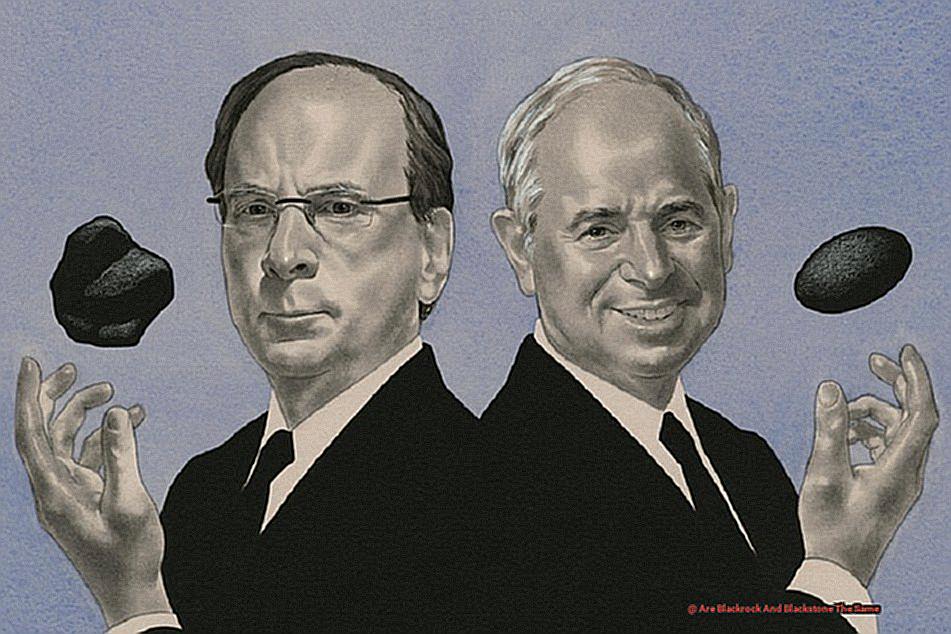
Today, we’re diving headfirst into a mind-boggling subject that has left many scratching their heads – the connection (or lack thereof) between BlackRock and Blackstone. Are these two behemoths of the financial world cut from the same cloth, or are they as different as night and day? Buckle up, because we’re about to unravel the truth behind their similarities and differences.
BlackRock and Blackstone, two names that echo through the corridors of high finance. But don’t let their similar-sounding monikers fool you – beneath the surface lies a fascinating tapestry of contrasting businesses, investment approaches, and even target audiences. We’re here to dissect it all and give you an insider’s look at what sets these financial titans apart.
In this blog post, we’ll take a deep dive into the histories of BlackRock and Blackstone, tracing their humble beginnings to their current positions as juggernauts shaping global markets. We’ll explore their distinct business models, venture into the diverse sectors they operate in, and shed light on the strategies that have propelled them to unparalleled success.
Whether you’ve been pondering whether BlackRock and Blackstone are cut from the same cloth or you simply crave a deeper understanding of the financial industry, this journey will provide invaluable insights. So fasten your seatbelts as we embark on a quest to demystify two of the most influential entities in finance.
Stay tuned for what’s coming next – we’ll be dissecting every intricate detail that sets BlackRock and Blackstone apart while uncovering any common ground they may share. Get ready for your curiosity to be satisfied and your financial expertise expanded.
Are BlackRock and Blackstone the same
Contents
- 1 Are BlackRock and Blackstone the same
- 2 Overview of BlackRock: A Leading Investment Management Firm
- 3 Overview of Blackstone: A Prominent Private Equity Firm
- 4 Business Models: Distinguishing Features of BlackRock and Blackstone
- 5 Client Base: Who do BlackRock and Blackstone Serve?
- 6 Investment Strategies: Passive vs Active Investing Approaches
- 7 Size and Influence: The Global Reach of BlackRock and Blackstone
- 8 Track Records: Delivering Returns to Investors
- 9 Conclusion
When it comes to financial giants, BlackRock and Blackstone are two names that often get mixed up due to their similar-sounding names. However, it’s important to note that these companies are not the same. In this article, we will explore the key differences between BlackRock and Blackstone, shedding light on their areas of expertise, client base, and investment strategies.
BlackRock: The Asset Management Powerhouse
BlackRock, founded in 1988, is the world’s largest asset management company with over $8 trillion in assets under management. Here’s what you need to know about BlackRock:
- Business Focus: BlackRock specializes in asset management, providing a wide range of investment products and services to both individual and institutional investors.
- Investment Products: BlackRock is renowned for its expertise in passive investing through its iShares exchange-traded funds (ETFs). It also offers active management strategies and risk management solutions.
- Client Base: BlackRock caters to a broad range of retail and institutional investors, offering investment solutions across various asset classes.
Blackstone: The Alternative Investment Specialist
Blackstone, established in 1985, is one of the largest alternative asset managers globally with nearly $600 billion in assets under management. Here’s what you should know about Blackstone:
- Business Focus: Blackstone specializes in private equity, real estate, hedge fund solutions, and credit investment strategies.
- Investment Strategies: Blackstone focuses on investing in companies, real estate properties, and other alternative assets to generate returns for its investors. It actively seeks opportunities for value creation through acquisitions and operational improvements.
- Client Base: While Blackstone does serve some individual investors, its primary focus is on institutional investors and high-net-worth individuals seeking exposure to alternative investments.
Key Differences Between BlackRock and Blackstone:

To better understand the distinctions between these financial giants, here are some key differences:
- Business Models: BlackRock primarily focuses on asset management, serving a wide range of investors. Blackstone, on the other hand, specializes in alternative asset management and primarily caters to institutional investors.
- Client Base: BlackRock serves both retail and institutional investors, while Blackstone predominantly works with institutional investors such as pension funds and sovereign wealth funds.
- Investment Strategies: BlackRock’s expertise lies in passive investing through ETFs and index funds, while Blackstone specializes in active investing within the private equity space.
Similarities:
Although BlackRock and Blackstone are different entities, they share some similarities:
- Size and Influence: Both companies are industry giants with significant global reach and influence. They manage substantial amounts of assets on behalf of their clients.
- Strong Track Records: BlackRock and Blackstone have established solid track records of delivering returns to their investors, earning them a reputable standing within the financial industry.
Overview of BlackRock: A Leading Investment Management Firm
BlackRock, a global investment management firm, has built a sterling reputation over the years due to its unique qualities and offerings. In this blog post, we’ll explore the key aspects that set BlackRock apart as a top investment management firm, including its wide range of financial products and services, expertise in investment advisory services, commitment to sustainable investing, technological infrastructure, and thought leadership in the industry.
Wide Range of Financial Products and Services:
BlackRock stands out for its diverse suite of financial products and services. The company offers a comprehensive range of investment solutions, including mutual funds, exchange-traded funds (ETFs), and separately managed accounts. With these offerings, BlackRock caters to investors with different objectives, from long-term wealth accumulation to income generation and risk management.
Expertise in Investment Advisory Services:
In addition to traditional asset management, BlackRock excels in providing investment advisory services to institutional clients. Through its Aladdin platform, the firm offers risk management and portfolio analytics tools that assist clients in making informed investment decisions. This expertise sets BlackRock apart as a trusted partner for pension funds, endowments, and sovereign wealth funds seeking professional guidance.
Commitment to Sustainable Investing:
BlackRock has demonstrated its commitment to sustainable investing by integrating environmental, social, and governance (ESG) factors into its investment processes. The company actively engages with companies on ESG issues, advocating for responsible corporate practices and transparency. BlackRock’s dedication to sustainability sets it apart as an industry leader driving positive change through investments.
Technological Infrastructure:
BlackRock’s strong technological infrastructure plays a crucial role in its success. The firm leverages advanced data analytics and artificial intelligence to gain insights into market trends and optimize investment strategies. This technological edge enables BlackRock to deliver efficient operations and consistent performance for its clients.
Thought Leadership:
BlackRock is known for its thought leadership in the financial industry. The company regularly publishes research reports and insights on market trends, economic outlooks, and investment strategies. Its experts are sought after for their expertise, often appearing in media and speaking at industry conferences. BlackRock’s thought leadership sets it apart as a trusted source of valuable information for investors.
Overview of Blackstone: A Prominent Private Equity Firm
With its headquarters in the heart of New York City, Blackstone has emerged as a force to be reckoned with, boasting a vast network of offices across major cities worldwide. Today, we will delve into the key facets that make Blackstone a standout player in the private equity realm.
Global Presence:
Blackstone’s global footprint sets it apart from its peers. With offices in strategic locations such as London, Hong Kong, and Mumbai, the firm has positioned itself at the forefront of international finance. This extensive network enables Blackstone to tap into diverse investment opportunities and provide unique insights into global markets.
Diverse Investment Strategies:
Blackstone’s success lies in its ability to adapt and excel across various investment strategies. Private equity serves as its core business, where the firm invests in companies, nurtures their growth, and maximizes their potential before divesting or taking them public. Additionally, Blackstone’s real estate division focuses on acquiring and managing properties across multiple sectors. The firm has also expanded into credit investments and infrastructure projects, broadening its reach and diversifying its portfolio.
Stellar Track Record:
Blackstone’s track record speaks volumes about its investment prowess. Over the years, the firm has consistently delivered impressive returns for its investors. This success can be attributed to the experienced professionals who form the backbone of Blackstone’s operations. Their industry knowledge and expertise contribute to a rigorous due diligence process and disciplined approach to investing, ensuring superior performance.
Global Relationships:
Blackstone’s extensive network of relationships is a key driver of its success. These connections with investors, companies, and governments provide valuable insights and access to lucrative investment opportunities. The firm’s size and scale also give it a competitive edge in negotiating deals and accessing capital markets, further enhancing its ability to generate superior returns.
Long-term Vision:
A distinguishing feature of Blackstone is its long-term investment horizon and patient approach. The firm understands that value creation takes time and is committed to nurturing investments for optimal growth. This patient outlook sets Blackstone apart from shorter-term-focused competitors, allowing it to navigate market cycles and capitalize on opportunities that others may overlook.
Diverse Investor Base:
Blackstone’s investor base is as diverse as its investment strategies. Pension funds, sovereign wealth funds, and high-net-worth individuals all trust Blackstone to generate strong returns on their behalf. This broad support reflects the confidence in the firm’s expertise and ability to deliver results.
Philanthropy and Social Responsibility:
Beyond its financial achievements, Blackstone displays a commitment to philanthropy and corporate social responsibility initiatives. The firm actively supports causes such as education and healthcare, using its resources to make a positive impact on society.
Business Models: Distinguishing Features of BlackRock and Blackstone
These behemoths have carved their own niches through unique approaches to asset management, investing strategies, and target markets. In this blog post, we will delve into their distinguishing features, shedding light on key differences in asset management versus alternative investments, passive investing versus active investing, and their respective target markets.
BlackRock: A Leader in Asset Management and Passive Investing
BlackRock’s business model revolves around its expertise in managing assets for institutional and individual investors. Key features that set BlackRock apart include:
- Asset Management Focus: BlackRock’s core strength lies in its extensive suite of investment products and services, including mutual funds, ETFs, and separate accounts. Its primary aim is to manage assets on behalf of clients.
- Passive Investment Approach: BlackRock is renowned for its iShares ETFs, which track specific market indexes. By offering low-cost investment options with broad market exposure, the company caters to investors who prefer a hands-off approach to investing.
- Active Management Offering: While passive investing is a cornerstone of BlackRock’s strategy, the company also offers actively managed funds managed by experienced portfolio managers. These funds aim to outperform benchmarks and provide more personalized investment solutions.
Blackstone: A Champion in Alternative Investments and Active Management
Blackstone’s business model differentiates itself through its focus on alternative investments and active management. Key features that distinguish Blackstone include:
- Alternative Investment Emphasis: Unlike BlackRock’s focus on traditional asset classes, Blackstone specializes in alternative investments such as private equity, real estate, hedge funds, and credit. This expertise allows them to identify attractive opportunities and generate strong returns.
- Active Investing Approach: With a hands-on management style, Blackstone actively manages its portfolio companies and real estate properties. This approach provides greater control over investments and potential value creation.
- Long-Term Investment Horizon: Blackstone’s patient approach sets it apart from traditional asset managers. By taking a longer-term perspective, the company aims to capture value over an extended time horizon, aligning with their objective to deliver superior risk-adjusted returns.

Target Markets: Attracting Different Investor Profiles
The target markets of BlackRock and Blackstone also contribute to their distinct business models:
- BlackRock: With its wide range of investment products and services, BlackRock caters to a broad range of investors, including institutional clients, individual investors, and financial advisors seeking low-cost, diversified investment options.
- Blackstone: Blackstone’s alternative investments and active management strategies appeal to sophisticated investors looking for higher-risk, higher-return opportunities. The company typically engages with institutional investors, pension funds, endowments, and wealthy individuals.
Client Base: Who do BlackRock and Blackstone Serve?
In the vast ocean of finance, two giants, BlackRock and Blackstone, reign supreme. While both investment management firms, they cater to different types of clients. In this blog post, we will explore the contrasting nature of their client bases, shedding light on the diverse investors they serve.
BlackRock: Where Institutional Investors Meet Retail Investors

BlackRock primarily caters to institutional investors, including pension funds, sovereign wealth funds, and insurance companies. These heavyweights entrust BlackRock with managing their assets on a grand scale. However, BlackRock also extends its services to individual investors through its retail division. With a wide range of investment products like mutual funds and exchange-traded funds (ETFs), BlackRock offers retail investors ample opportunities to grow their wealth.
Blackstone: Serving the Elite and Institutions
While Blackstone also serves institutional investors, it has a stronger focus on high-net-worth individuals seeking specialized investment opportunities. Wealthy individuals, family offices, endowments, foundations, and pension funds flock to Blackstone for its expertise in private equity, real estate, credit, and hedge fund solutions. These clients have higher net worths and access to larger sums of capital, allowing them to pursue more exclusive investment avenues.
Comparing the Client Bases:
Retail vs. Specialized Investors:
Global Reach:
Asset Servicing Divisions:
Investment Strategies: Passive vs Active Investing Approaches
Passive Investing: Set It and Forget It
Passive investing involves a buy-and-hold strategy where investors aim to replicate the performance of a specific market index, such as the SandP 500. This strategy typically involves investing in low-cost index funds or exchange-traded funds (ETFs), which provide broad exposure to a particular market segment or asset class.
The objective of passive investing is to capture the overall returns of the market rather than trying to outperform it. This approach is based on the belief that markets are generally efficient, meaning that stock prices already reflect all available information. Therefore, it is difficult for investors to consistently beat the market over the long term.
Passive investors build a diversified portfolio that closely tracks a specific index. By doing so, they aim to minimize risk and achieve consistent returns over time. Passive investing is often favored by individual investors who prefer a more hands-off approach to managing their investments.
Active Investing: Seeking Alpha
In contrast, active investing involves a more hands-on approach, where investors attempt to outperform the market by actively selecting individual stocks or making tactical asset allocation decisions. Active managers rely on research, analysis, and their own judgment to identify undervalued securities or market trends that can lead to superior returns.
Active investing strategies can take various forms, ranging from value investing, where investors look for stocks that are trading below their intrinsic value, to growth investing, where investors focus on companies with high growth potential. Active managers also have the flexibility to adjust their portfolios based on changing market conditions or their own outlook.
While active investing can potentially generate higher returns than passive investing if successful, it comes with higher costs and risks. Active managers typically charge higher fees for their services compared to passive funds, and the added expenses can eat into investment returns over time. Additionally, active investing requires skill and expertise in stock selection and market timing, which not all investors possess.
Choosing the Right Approach
Deciding whether to pursue a passive or active investing approach depends on various factors, including an individual’s risk tolerance, time horizon, and investment goals. Both approaches have their merits and drawbacks, and there is no one-size-fits-all solution.
Passive investing offers simplicity, lower costs, and broad market exposure. It is well-suited for investors who prefer a long-term, low-maintenance strategy and are satisfied with achieving market returns.
Active investing, on the other hand, offers the potential for higher returns but requires more time, effort, and skill. It is better suited for investors who are willing to take on more risk and actively manage their portfolios to seek out opportunities for alpha generation.
Size and Influence: The Global Reach of BlackRock and Blackstone
In the ever-evolving financial industry, two giants stand out for their size and influence – BlackRock and Blackstone. As an expert in this field, I will provide a comprehensive analysis of these firms, exploring their market capitalization, asset management capabilities, investment strategies, and impact on corporate governance and urban development.
Market Capitalization and Asset Management:
BlackRock, with a market capitalization of over $130 billion, is the largest asset manager globally. Its size and influence can be attributed to its extensive product offerings, strong brand reputation, and global reach. As of 2021, BlackRock manages over $9 trillion in assets, making it the go-to choice for institutional clients and individual investors alike.
Blackstone, with a market capitalization of approximately $100 billion, is no small player either. While its market capitalization may be smaller than that of BlackRock, it manages approximately $684 billion in assets across various alternative asset classes. This includes private equity, real estate, credit, and hedge funds.
Investment Strategies:
BlackRock and Blackstone both offer a wide range of investment products and strategies tailored to meet the diverse needs of their clients. BlackRock’s focus is primarily on traditional asset management, providing investment management, risk management, and advisory services to its clients. On the other hand, Blackstone specializes in alternative asset management, with a particular emphasis on private equity investments.
Corporate Governance Influence:
BlackRock’s influence on global financial markets is particularly noteworthy. As one of the largest shareholders in many major corporations worldwide, it has significant voting power. This gives the company the ability to influence corporate governance decisions and advocate for sustainable business practices. BlackRock has made commitments to integrate sustainability into its investment processes, driving positive change in the companies it invests in.
Impact on Urban Development:
Blackstone’s investments in real estate have played a crucial role in shaping urban landscapes and revitalizing communities. Through its expertise in real estate, the firm has transformed neglected areas into thriving neighborhoods, creating opportunities for economic growth and development.
Track Records: Delivering Returns to Investors
In this blog post, we will dive into the investment strategies that have propelled these giants to deliver impressive returns to their loyal followers.
BlackRock’s Passive Powerhouse:
BlackRock’s reputation as a passive investing pioneer is well-deserved. Their expertise lies in index funds and exchange-traded funds (ETFs) that mirror market indexes. By offering a diverse range of investment products, they have enabled investors to tap into the potential of broad market movements. This approach has consistently outperformed many actively managed funds, delivering steady returns while minimizing fees.
Blackstone’s Alternative Allure:
While BlackRock dominates the world of passive investing, Blackstone has carved its niche as a private equity firm specializing in alternative investments. Their strategy revolves around acquiring and managing companies, real estate properties, and other assets. While these investments tend to be illiquid and long-term in nature, they offer the allure of potentially higher returns for sophisticated investors willing to embrace risk.
Track Record Triumphs:
Both BlackRock and Blackstone boast commendable track records in delivering returns to their investors. However, it is essential to understand the nuances of their respective approaches. BlackRock’s passive investing prowess has consistently outperformed many actively managed funds over time. On the other hand, Blackstone’s alternative investments have rewarded patient investors with substantial gains in industries such as real estate and private equity.
Targeted Appeal:
BlackRock caters to a broad investor base, offering investment products that suit various risk appetites. Their products are accessible to retail investors seeking diversification and institutional investors looking for cost-effective solutions. In contrast, Blackstone’s offerings are tailored towards sophisticated investors who are willing to navigate higher levels of risk in pursuit of potentially higher returns.
Conclusion:
In the realm of investment giants, BlackRock and Blackstone stand tall with their unique strategies. While both have successfully delivered returns to investors, their areas of focus and approaches set them apart. BlackRock’s passive investing dominance offers stability and broad market exposure, while Blackstone’s alternative investments present opportunities for higher returns but require patience and risk tolerance.
Remember, dear readers, before embarking on your investment journey, carefully evaluate your own goals, risk tolerance, and time horizon. Understanding these factors will guide you in choosing the investment firm that best aligns with your needs.
Conclusion
In conclusion, it is clear that BlackRock and Blackstone are not the same entity. While both are prominent financial firms with similar-sounding names, they differ significantly in their operations, focus, and areas of expertise.
BlackRock is the world’s largest asset management firm, managing trillions of dollars in assets for a diverse range of clients. They specialize in providing investment solutions, portfolio management services, and financial advice to individuals, institutions, and governments worldwide. With their vast resources and global reach, BlackRock has established itself as a leader in the industry.
On the other hand, Blackstone is a leading alternative investment management firm. They focus on private equity investments, real estate investments, hedge funds, credit investments, and more. Their expertise lies in identifying unique investment opportunities and creating value through strategic acquisitions and partnerships.
While both companies have achieved tremendous success in their respective fields, it is important to recognize that they operate independently from one another. Each has its own distinct strategies, investment philosophies, and client base.
So no matter how similar their names may sound or how often they are mentioned together in financial discussions, it is crucial to understand that BlackRock and Blackstone are separate entities with different purposes and areas of specialization.
In conclusion: BlackRock and Blackstone may share similarities in name but are distinct entities with unique operations and expertise within the financial industry.


